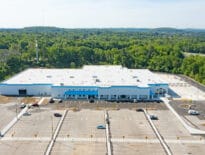Employment in the Massachusetts biopharmaceutical sector will need to keep climbing to meet industry demand after growing 5.5 percent to nearly 85,000 jobs in 2020, a year marked by an economic downturn resulting from the COVID-19 pandemic, according to a new industry report.
In its annual Industry Snapshot released Wednesday, the Massachusetts Biotechnology Council said the 82,496 jobs recorded last year represent 92 percent growth over the last 15 years.
Projecting the state may need up to 40,000 net new biopharma employees by 2024 based on the amount of labs and biomanufacturing space in development, MassBio said the record-breaking rates at which Massachusetts-headquartered firms are raising venture capital funds is leading to “incredible growth in the real estate pipeline to meet the demand of biopharma companies that are choosing to launch and scale across Massachusetts.”
Finding talent to fill those roles will amount to “a significant challenge,” the report concluded, flagging external factors central to the ability to attract and retain biopharma workers — housing, transportation and child care.
High housing costs, congested Boston-area commutes, and the expense and availability of child care are all issues state and business leaders have been grappling with as they contemplate ways to retain and attract workers amid shifts to remote-work models and other pandemic-driven habit changes.
As remote workers spend more time at home, a recent “Future of Work” analysis prepared by McKinsey & Co. for the Baker Administration estimated that demand for office real estate could decrease by as much as 10 percent to 20 percent by 2030. That analysis acknowledged “early, emerging evidence of office spaces being converted to lab spaces in an effort to meet R&D and medical companies’ growing demand for in-person work environments.”
MassBio’s report found that the state added almost 5 million square feet of lab space from 2020 to 2021, and cited projections indicating that another 20 million square feet of lab and biomanufacturing space could be built out by 2024.
After hitting a peak of $5.8 billion in 2020, biopharma companies headquartered here raised $4.3 billion in venture capital in the first quarter of 2021, the report said.
The industry also benefits from public investment, with significant bond bills, tax credits and other programs targeting education, research and development and workforce training in the life sciences. In June 2018, Gov. Charlie Baker signed a life sciences bill that called for $473 million in capital spending over five years.
Kendalle Burlin O’Connell, MassBio’s president and chief operating officer, said investments in life sciences allow “biopharma companies to conduct game-changing research in an attempt to address patients’ greatest unmet medical needs” and that the industry’s growth creates opportunities for the state and its residents.
“But we’ve reached an inflection point in Massachusetts – we must focus on expanding Massachusetts’ biopharma footprint beyond Boston/Cambridge, developing new biomanufacturing facilities, and recruiting, retaining, and educating the next generation of skilled talent to ensure Massachusetts remains the best place in the world for the life sciences,” she said.
Much of the industry has been concentrated in the Cambridge and Boston areas. About a third of MassBio’s dues-paying life sciences members, or 251 members, are located in Cambridge, and another 90 are in Boston.
The largest biopharma employers in Massachusetts are Takeda, with 6,750 workers, and Sanofi, with 4,000. Two companies associated with COVID-19 vaccines, Pfizer (2,250 employees) and Moderna (1,738 employees), landed at number six and seven on the list, respectively.







